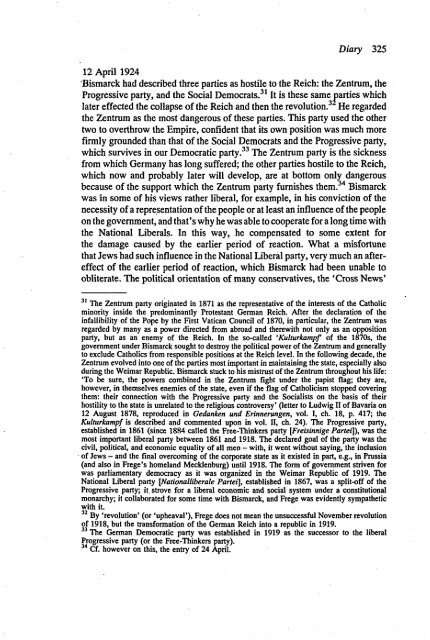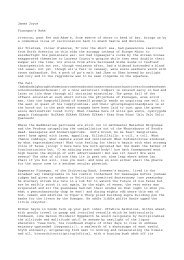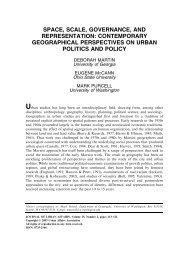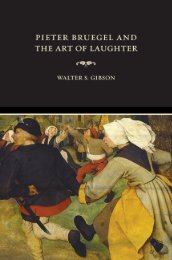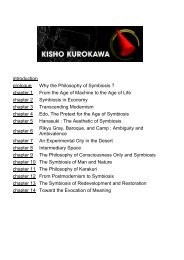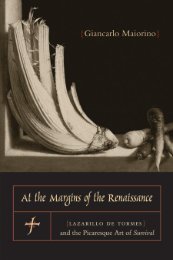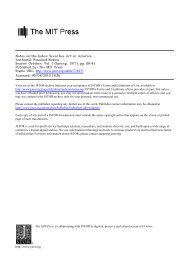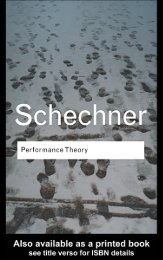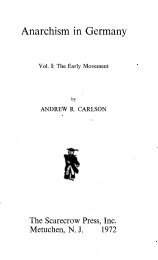Diary: Written by professor Dr Gottlob Frege in the ... - AAAARG.ORG
Diary: Written by professor Dr Gottlob Frege in the ... - AAAARG.ORG
Diary: Written by professor Dr Gottlob Frege in the ... - AAAARG.ORG
You also want an ePaper? Increase the reach of your titles
YUMPU automatically turns print PDFs into web optimized ePapers that Google loves.
<strong>Diary</strong> 325<br />
12 April 1924<br />
Bismarck had described three parties as hostile to <strong>the</strong> Reich: <strong>the</strong> Zentrum, <strong>the</strong><br />
Progressive party, and <strong>the</strong> Social Democrats. 31 It is <strong>the</strong>se same parties which<br />
later effected <strong>the</strong> collapse of <strong>the</strong> Reich and <strong>the</strong>n <strong>the</strong> revolution. 3 He regarded<br />
<strong>the</strong> Zentrum as <strong>the</strong> most dangerous of <strong>the</strong>se parties. This party used <strong>the</strong> o<strong>the</strong>r<br />
two to overthrow <strong>the</strong> Empire, confident that its own position was much more<br />
firmly grounded than that of <strong>the</strong> Social Democrats and <strong>the</strong> Progressive party,<br />
which survives <strong>in</strong> our Democratic party. 33 The Zentrum party is <strong>the</strong> sickness<br />
from which Germany has long suffered; <strong>the</strong> o<strong>the</strong>r parties hostile to <strong>the</strong> Reich,<br />
which now and probably later will develop, are at bottom only dangerous<br />
because of <strong>the</strong> support which <strong>the</strong> Zentrum party furnishes <strong>the</strong>m. 34 Bismarck<br />
was <strong>in</strong> some of his views ra<strong>the</strong>r liberal, for example, <strong>in</strong> his conviction of <strong>the</strong><br />
necessity of a representation of <strong>the</strong> people or at least an <strong>in</strong>fluence of <strong>the</strong> people<br />
on <strong>the</strong> government, and that's why he was able to cooperate for a long time with<br />
<strong>the</strong> National Liberals. In this way, he compensated to some extent for<br />
<strong>the</strong> damage caused <strong>by</strong> <strong>the</strong> earlier period of reaction. What a misfortune<br />
that Jews had such <strong>in</strong>fluence <strong>in</strong> <strong>the</strong> National Liberal party, very much an aftereffect<br />
of <strong>the</strong> earlier period of reaction, which Bismarck had been unable to<br />
obliterate. The political orientation of many conservatives, <strong>the</strong> 'Cross News'<br />
31 The Zentrum party orig<strong>in</strong>ated <strong>in</strong> 1871 as <strong>the</strong> representative of <strong>the</strong> <strong>in</strong>terests of <strong>the</strong> Catholic<br />
m<strong>in</strong>ority <strong>in</strong>side <strong>the</strong> predom<strong>in</strong>antly Protestant German Reich. After <strong>the</strong> declaration of <strong>the</strong><br />
<strong>in</strong>fallibility of <strong>the</strong> Pope <strong>by</strong> <strong>the</strong> First Vatican Council of 1870, <strong>in</strong> particular, <strong>the</strong> Zentrum was<br />
regarded <strong>by</strong> many as a power directed from abroad and <strong>the</strong>rewith not only as an opposition<br />
party, but as an enemy of <strong>the</strong> Reich. In <strong>the</strong> so-called 'Kulturkampf of <strong>the</strong> 1870s, <strong>the</strong><br />
government under Bismarck sought to destroy <strong>the</strong> political power of <strong>the</strong> Zentrum and generally<br />
to exclude Catholics from responsible positions at <strong>the</strong> Reich level. In <strong>the</strong> follow<strong>in</strong>g decade, <strong>the</strong><br />
Zentrum evolved <strong>in</strong>to one of <strong>the</strong> parties most important <strong>in</strong> ma<strong>in</strong>ta<strong>in</strong><strong>in</strong>g <strong>the</strong> state, especially also<br />
dur<strong>in</strong>g <strong>the</strong> Weimar Republic. Bismarck stuck to his mistrust of <strong>the</strong> Zentrum throughout his life:<br />
'To be sure, <strong>the</strong> powers comb<strong>in</strong>ed <strong>in</strong> <strong>the</strong> Zentrum fight under <strong>the</strong> papist flag; <strong>the</strong>y are,<br />
however, <strong>in</strong> <strong>the</strong>mselves enemies of <strong>the</strong> state, even if <strong>the</strong> flag of Catholicism stopped cover<strong>in</strong>g<br />
<strong>the</strong>m: <strong>the</strong>ir connection with <strong>the</strong> Progressive party and <strong>the</strong> Socialists on <strong>the</strong> basis of <strong>the</strong>ir<br />
hostility to <strong>the</strong> state is unrelated to <strong>the</strong> religious controversy' (letter to Ludwig II of Bavaria on<br />
12 August 1878, reproduced <strong>in</strong> Gedanken und Er<strong>in</strong>nerungen, vol. I, ch. 18, p. 417; <strong>the</strong><br />
Kulturkampf is described and commented upon <strong>in</strong> vol. II, ch. 24). The Progressive party,<br />
established <strong>in</strong> 1861 (s<strong>in</strong>ce 1884 called <strong>the</strong> Free-Th<strong>in</strong>kers party [Freis<strong>in</strong>nige Partei]), was <strong>the</strong><br />
most important liberal party between 1861 and 1918. The declared goal of <strong>the</strong> party was <strong>the</strong><br />
civil, political, and economic equality of all men - with, it went without say<strong>in</strong>g, <strong>the</strong> <strong>in</strong>clusion<br />
of Jews - and <strong>the</strong> f<strong>in</strong>al overcom<strong>in</strong>g of <strong>the</strong> corporate state as it existed <strong>in</strong> part, e.g., <strong>in</strong> Prussia<br />
(and also <strong>in</strong> <strong>Frege</strong>'s homeland Mecklenburg) until 1918. The form of government striven for<br />
was parliamentary democracy as it was organized <strong>in</strong> <strong>the</strong> Weimar Republic of 1919. The<br />
National Liberal party [Nationalliberale Partei], established <strong>in</strong> 1867, was a split-off of <strong>the</strong><br />
Progressive party; it. strove for a liberal economic and social system under a constitutional<br />
monarchy; it collaborated for some time with Bismarck, and <strong>Frege</strong> was evidently sympa<strong>the</strong>tic<br />
with it.<br />
32 By 'revolution' (or 'upheaval'), <strong>Frege</strong> does not mean <strong>the</strong> unsuccessful November revolution<br />
of 1918, but <strong>the</strong> transformation of <strong>the</strong> German Reich <strong>in</strong>to a republic <strong>in</strong> 1919.<br />
33 The German Democratic party was established <strong>in</strong> 1919 as <strong>the</strong> successor to <strong>the</strong> liberal<br />
Progressive party (or <strong>the</strong> Free-Th<strong>in</strong>kers party).<br />
34 Cf. however on this, <strong>the</strong> entry of 24 April.


